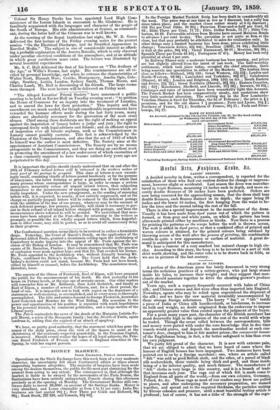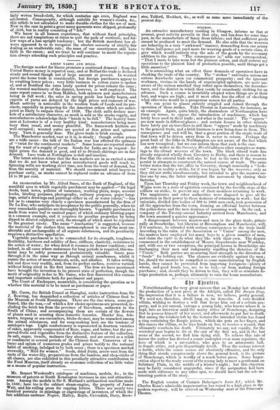FRAUDS IN EXPORTS.
A portion of the American press has lately denounced in very strong terms the nefarious practices of a cotton-grower, who put large stones inside his bales, to increase their weight; and they suggest that mer- chants should associate together to drive the cheating grower's produce out of the market.
Years ago, such a roguery frequently occurred with bales of China silk ; and Chinese stones and dirt were often thus imported into England. Nowadays, agents who may be relied upon superintend the shipment of the silk ; and we have the raw material invariably unaccompanied by these strange foreign substances. The heavy "fag" or " tab " inside a piece of India or China silk handkerchiefs, or bandannas, to increase its bulk and weight, no doubt originated from the endeavour to impose an apparently greater value than existed upon the judgment of the buyer. For a great many years past, the character of the British merchant has stood deservedly high in the opinion of the rest of the world with whom he traded. Though the ocean rolled between the correspondents, bills and money were parted with under the sure knowledge that in due time vessels would arrive, and deposit the merchandise needed at each cus- tomer's door, charged to him at fair market prices ; the commercial honour of the Englishman being, in fact, a far better safeguard to him than even his own judgment.
We justly felt proud of the character. It is now with extreme pain, that we are obliged to admit that we have heard of cases where the honour of English houses has been impugned. Two instances have been pointed out to us by a foreign merchant ; one, where an article called "felt" was sold as good British cloth, and the other, of a parcel of black silk neckerchiefs, those outside being thick and good, and those inside being of a far inferior quality, and much thinner. The manufacture of " felt " cloths is very large in this country, and it is a branch of trade that increases each year. The rags out of which felt is made come to England from all parts of the world,--from our own colonies, Germany, Poland, &c. 8m. These rags as most of our readers may know are pulled to pieces, and after undergoing the necessary preparation, are massed together, and spread out to the required thickness, the particles uniting by fibrous cohesion and pressure, until a most beautiful looking article is produced ; but of course, it has not a tithe of the strength of the regu-
larly woven broad-cloth, for which centuries ago even, England was celebrated. Consequently, although suitable for women's cloaks, &c., this article is not calculated to make durable clothes for the use of men. Now in the case in point a great many garments were shipped, professedly of cloth, but in reality consisting of "felt." We know in all human experience, that without fixed principles, there are sad temptations at times to quit the path of rectitude, and fol- low ways of a less upright tendency; but the British merchant has al- ways appeared to us to recognize the ohsolute necessity of strictly fair dealing as an unalterable rule; the mass of our countrymen still have faith in the canon ; and we trust he will continue to merit the reputa- tion always attending such principles and practice.



























 Previous page
Previous page